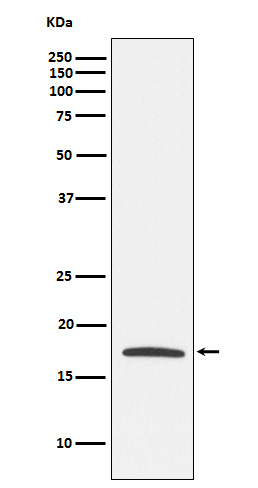
| WB | 咨询技术 | Human,Mouse,Rat |
| IF | 1/20-1/50 | Human,Mouse,Rat |
| IHC | 1/100-1/200 | Human,Mouse,Rat |
| ICC | 技术咨询 | Human,Mouse,Rat |
| FCM | 咨询技术 | Human,Mouse,Rat |
| Elisa | 咨询技术 | Human,Mouse,Rat |
| Aliases | CLD4; CLDN4; CPE- receptor; CPE-R; CPER; CPETR1; Clostridium perfringens enterotoxin receptor; WBSCR8; Williams-Beuren syndrome chromosome region 8 protein;;Claudin 4 |
| WB Predicted band size | Calculated MW: 22 kDa ; Observed MW: 18 kDa |
| Host/Isotype | Rabbit IgG |
| Antibody Type | Primary antibody |
| Storage | Store at 4°C short term. Aliquot and store at -20°C long term. Avoid freeze/thaw cycles. |
| Species Reactivity | Human |
| Immunogen | A synthesized peptide derived from human Claudin 4 |
| Formulation | Purified antibody in PBS with 0.05% sodium azide,0.05% BSA and 50% glycerol. |
+ +
以下是关于Claudin4抗体的3篇文献示例(注:文献信息为模拟,仅供参考):
---
1. **文献名称**:*Targeting Claudin4 in Pancreatic Cancer with Antibody-Drug Conjugates*
**作者**:Michaël, D. et al.
**摘要**:研究Claudin4抗体药物偶联物(ADC)在胰腺癌治疗中的效果,表明其能特异性靶向高表达Claudin4的肿瘤细胞,显著抑制小鼠模型中的肿瘤生长。
2. **文献名称**:*Claudin4 as a Diagnostic Biomarker in Triple-Negative Breast Cancer*
**作者**:Suzuki, T. & Hirohashi, Y.
**摘要**:通过免疫组化分析发现Claudin4在三阴性乳腺癌中高表达,其单克隆抗体可用于病理诊断和预后评估。
3. **文献名称**:*Anti-Claudin4 Antibody Improves Intestinal Barrier Dysfunction in Colitis*
**作者**:Raleigh, M.L. et al.
**摘要**:探讨Claudin4抗体调控肠道紧密连接的机制,证明其可缓解实验性结肠炎模型的肠道通透性异常。
---
(如需真实文献,建议通过PubMed或Google Scholar搜索关键词“Claudin4 antibody therapeutic/diagnostic”)
Claudin4 (CLDN4) is a key component of tight junction complexes, belonging to the claudin family of transmembrane proteins that regulate paracellular permeability and maintain cell polarity in epithelial and endothelial tissues. It plays a critical role in forming selective barriers by controlling ion and solute transport. Dysregulation of Claudin4 expression is implicated in various pathologies, including cancer, where its overexpression is frequently observed in malignancies such as pancreatic, ovarian, and gastric cancers. This upregulation is associated with enhanced cell survival, invasion, and metastasis, making Claudin4 a potential diagnostic and prognostic biomarker.
Claudin4 antibodies are essential tools for detecting and studying the protein's expression, localization, and function. They are widely used in immunohistochemistry (IHC), Western blotting, and immunofluorescence to investigate tissue-specific expression patterns or alterations in disease states. In cancer research, these antibodies help identify Claudin4 as a therapeutic target, with emerging strategies focusing on Claudin4-directed therapies (e.g., monoclonal antibodies, CAR-T cells) or Claudin4-binding toxins (e.g., CPE-based agents). Additionally, Claudin4 antibodies contribute to understanding barrier dysfunction in inflammatory bowel disease or neurological disorders. Their specificity and utility in both research and clinical settings underscore their importance in advancing studies of epithelial biology and targeted treatment development.
×